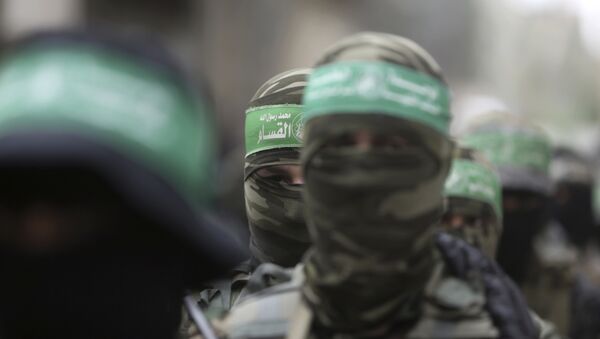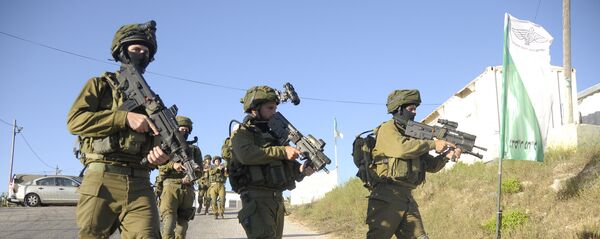At least 38 Palestinians have been injured amid protests on the Israel-Gaza border, Gaza's Ministry of Health reported. Hundreds of protesters called on Israel to go back to its pre-1967 borders and demanded that the issue of Palestinian refugees be resolved.
The World Health Organisation estimated that since the eruption of the protests in March 2018, at least 190 Gazans have been killed and 28 thousand others wounded amid clashes with Israeli security forces.
But Hani Albassous, an expert on the Israeli-Palestinian conflict and a native of Gaza, currently based in Oman, said that although the weekly riots that are organised by Hamas are used to escalate tensions, the group is not interested in a full-fledged war.
Still Licking Its Wounds
"Hamas hasn't forgotten the destruction Israel caused in the 2014 war. Infrastructure was completely destroyed. And they are not ready for another round," he said.
According to estimates by the Palestinian Authority, Gaza needed some $7.8 billion to reconstruct the damages of the 2014 operation Protective Edge. Back then, Israel's shelling destroyed or severely damaged 18000 housing units, leaving more than 100 thousand Palestinians homeless – UN reports reported.
So another war would not only mean more damage but also losing public support. According to a 2018 poll, conducted by the Palestinian Center for Policy and Survey Research, 61 per cent of Gazans supported a long-term cessation of violence between Israel and Hamas.
No War in Sight?
Fearing public frustration says the expert, Hamas will not rush to exercise force unless they face an existential threat. "If Israel assassinates one of the Hamas or Islamic Jihad leaders it will push the military groups to seek revenge," he stated, referring to 2012 operation Pillar of Defence that kicked off following Israel's assassination of Ahmed Jabari, one of Hamas' top leaders.
Yet, as it is often the case in the Middle East, wars can also erupt because of events of a smaller magnitude. In 2006, it was the kidnapping of two Israeli soldiers that caused the Second Lebanon War, and in 2014 the kidnapping and the subsequent murder of three Israeli teens prompted Israel to start its Operation Protective Edge, that also aimed to restore security in Israel's southern region that had been suffering from the constant barrage of rockets emanating from the Gaza Strip.
In addition, war can also start regardless of Hamas' readiness or will. Apart from Hamas and the Islamic Jihad, considered to be two most prominent groups, the Gaza Strip has a dozen other military cells that demand a return to the intense armed struggle against Israel.
They popped up as a result of Israel's blockade – imposed in 2007 – and the severe financial crisis that followed soon after. Palestinian institutions were unable to pay salaries to employees, something that deteriorated people's financial situation and increased widespread frustration with Hamas and the public institutions it represented.
Although smaller and despite far more modest military capabilities, they can still cause damage that will lead to a snowball effect. In 2019 alone there were at least three instances of sporadic fire towards Israel by groups not connected to Hamas.
The Islamic group is aware of the threat they pose. In 2016, for example, they conducted mass arrests and confiscated their weapons, but that didn't stop the groups from flourishing.
"You don't really need Hamas' "barrage of rockets", said Alon Eviatar, a retired Israeli colonel and an intelligence officer, who served in the Palestinian territories for nearly three decades. "All you need to paralyse the entire country is a couple of rockets launched at Tel Aviv or another major city in Israel", he added.
Unlike the small and radical groups that don't necessarily practice restraint, Eviatar believes Hamas maintains a delicate balance. "Hamas plays a political game. On the one hand, it lets smaller groups vent their anger by firing rockets at Israeli cities, but on the other, it shows no intention to start a full-fledged war. So they simply try their luck, hoping that now as Israel is struggling to form a government, there will be no response and no retaliation," he stated.
According to the Jerusalem Centre for Public Affairs, an Israeli think tank that focuses on Israeli security, regional diplomacy and international law, Hamas possesses a 40-thousand soldiers' strong army in addition to reservists and elite units. The group also has 20 thousand rockets as well as several drones, mines and various explosives. But, most importantly, they have hundreds of military tunnels that will be used, when the time is ripe, to penetrate Israeli towns, kidnap residents and carry out terrorist attacks.
"They managed to build a network of tunnels that are basically a city under a city", said Albassous, adding that the group is continuously working on new techniques and developing new technologies.
"So if a war does take place, it will be more destructive than what we experienced in 2014, as their rockets will not only reach targets located deep in Israeli territory but will also damage Israel's infrastructure, including key facilities such as ports and the Ben Gurion airport", said the expert.
This threat might leave Israel with only one option: a ground invasion. But this doesn't seem likely. Last week, former head of Combat Intelligence Corps of the Israel Defence Forces Miri Eisin said that no Israeli government would be ready to invade Gaza, fearing the loss of human lives.
Albassous agrees. "Entering Gaza will be suicidal for Israel. Firstly, lots of human lives will be lost and, secondly, conquering and controlling Gaza will have dire economic repercussions for whoever controls it. Given the fact that the place is completely destroyed, Israel will need to invest billions of dollars to repair it – a price that Israel is not ready to pay," he concluded.




